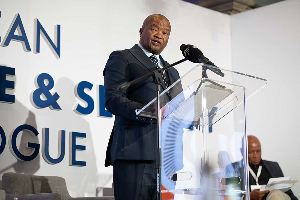The Deputy Minister of Defence for South Africa, Bantu Holomisa, called for the revival of commitment to deal with the complexities of African conflicts through diplomatic, political, and economic means.
Speaking on Day 2 of the inaugural African Peace & Security Dialogue in Johannesburg on 5 October 2024, Holomisa emphasized building on the gains so far made through the African Union's "Silencing the Guns by 2020" initiative, while addressing key drivers of conflict across the continent.
Holomisa said the lofty aspiration to silence guns by 2020 may not have been fully attained, but it was a "bold declaration of our collective desire to bring an end to conflicts on our soil." He said " significant progress has been made," and as such, African countries must "build on those achievements by strengthening our resolve to silence the guns for good, through diplomatic, political, and economic efforts."
But Holomisa first emphasized that all the conflicts in Africa are complex and multi-dimensional in character: "Each conflict is unique, rooted in a mixture of historical, economic, political, and social factors."
He nonetheless mentioned the common drivers of conflict to attain lasting peace. On top of the list was poor governance. "Weak institutions, corruption, and the absence of rule of law create environments where violence can easily take root," he said.
Holomisa added that the excluded population, which is kept out of political and economic processes, often adopts violent means to seek solutions, hence addressing structural inequalities becomes important.
He further mentioned that another major factor contributing to unrest is economic underdevelopment. " When people are denied access to basic needs like food, water, education, and employment, the ground becomes fertile for unrest. Development and peace must go hand in hand," said Holomisa, who called for efforts to ensure every African citizen has access to opportunities for dignified lives.
The external interference in African conflicts was also pointed out as a big challenge. " Africa has historically been a battleground for global powers seeking to advance their strategic interests," Holomisa noted, adding that "this external manipulation continues today, often exacerbating existing tensions and prolonging conflicts."
He emphasized that vigilance is required to defend African sovereignty, ensuring that outside involvement in peacemaking processes agrees with African interests. Holomisa added that the root causes of conflict can only be eradicated by having better institutions and accountable leadership.
"It is only through the creation of robust governance frameworks that we can ensure the rule of law, protect human rights, and provide avenues for peaceful conflict resolution," he said. "Leaders must be accountable to the people they serve, and governance structures must reflect the needs and aspirations of the population. Corruption, which remains a cancer eating away at the fabric of many African societies, must be rooted out with determination."
The Deputy Minister also emphasized the role of the AU's Peace and Security Architecture, especially its preventive mechanisms such as early warnings, mediation efforts, and peacekeeping operations. He called for strengthening these mechanisms and underscored that from a multi-stakeholder approach, the private sector is taken on board, as is civil society and youth.
"Our defence forces have long played a critical role in maintaining peace and security across the continent," Holomisa said. He noted that beyond conflict zones, African militaries play critical roles in humanitarian missions, in reconstruction efforts, and in providing essential services in post-conflict settings.
He called for African militaries to assume "a human-centric approach to security—one that prioritizes the protection of civilians, upholds human rights and seeks to build trust between security forces and local communities."
Holomisa recapitalized Africa's self-sustaining capacity, as manifested through efforts like the African Standby Force and its numerous regional peacekeeping missions. He also cited the nature of these peace and security challenges as global ones, including terrorism and cyber threats, while insisting on fair partnership with international organizations like the United Nations.
He concluded, "Africa must approach the global stage as an equal partner, with our sovereignty respected and our needs prioritized," urging that lessons from past international interventions inform future engagements.
The objective of the Annual African Peace & Security Dialogue, organized by Thabo Mbeki Foundation, is to provide a platform for African political & economic leaders, scholars, and policymakers to discuss current peace and security challenges facing the continent, share best practices, and develop practical solutions. The dialogue seeks to deepen understanding and stimulate a robust debate on African-led solutions to peace and security challenges.
BB




















